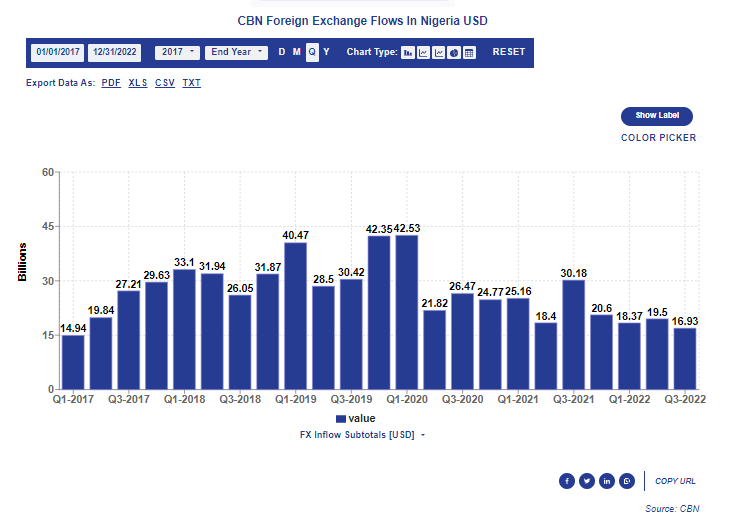
Nigeria’s dollar inflow dropped to a five-year low of $16.93 billion in the third quarter of 2022, a 43.9% fall from the $30.18 billion recorded in the same period of 2021 and a 13.2% decrease from the $19.5 billion received in the preceding quarter.
According to data obtained from the Central Bank of Nigeria (CBN), Nigeria attracted $54.81 billion between January and September 2022, which is 25.7% less than the $73.74 billion it attracted during the same time period in 2021.
Highlights of Forex flows
According to the data breakdown, the Nigerian economy received $7.28 billion in Q3 2022 through the CBN, representing 43% of all inflows during the study period, while $9.66 billion came in through autonomous sources.
On the other hand, outflows decreased from $11.03 billion in the previous quarter to $9.93 billion in Q3 2022. The CBN statistics show that while autonomous sources accounted for $1.39 billion, outflows through the CBN were $8.54 billion.
Accordingly, net FX flow through the Nigerian economy was $7 billion in Q3 2022, down 64.9% from $19.96 billion in the same quarter last year and down 17.3% from $8.47 billion in the preceding period.
The decline in Nigeria’s FX inflow may be attributed to reduced earnings from crude oil export, largely due to oil theft, and reduced production capacity amongst others. In the same vein, the economy has also not been appealing to foreign investors in recent times, considering the interest-to-inflation rate ratio, and its impact on the real returns of investors.
FX crunch impacting exchange rate: The Nigerian economy has suffered a significant FX crunch in recent years, especially since the covid-19 pandemic in 2020.
Naira at risk of further devaluations: The exchange rate faces a further risk of devaluations in the future, owing to the tightened FX supply in the economy. For example, the CBN’s supply of FX in the official market has dipped significantly in recent times.
Bottom line: The impact of Nigeria’s dwindling FX inflow cannot be overemphasized considering its significant impact on the exchange rate, inflation rate, and the broader economy. It is imperative for the government and the central bank to drive policies that will encourage dollar earnings into the country.
Although the CBN launched the RT200 FX scheme and the Naira4dollar policy in a bid to encourage forex inflows, they are yet to drive the numbers substantially.
Culled from Nairametrics.
Paris Saint-Germain star Achraf Hakimi has spoken out following his defeat by Ademola Lookman for…
Ukrainian boxer Oleksandr Usyk reinforced his position as one of the greatest heavyweight champions in…
The National Emergency Management Agency (NEMA) has said it has put all its zonal, territorial…
Erhiatake Ibori-Suenu, member representing Ethiope Federal Constituency of Delta State in the House of Representatives…
The Economic and Financial Crimes Commission (EFCC) has reportedly secured a final forfeiture order for…
An unverified number of residents are feared to have died after a stampede occurred in…